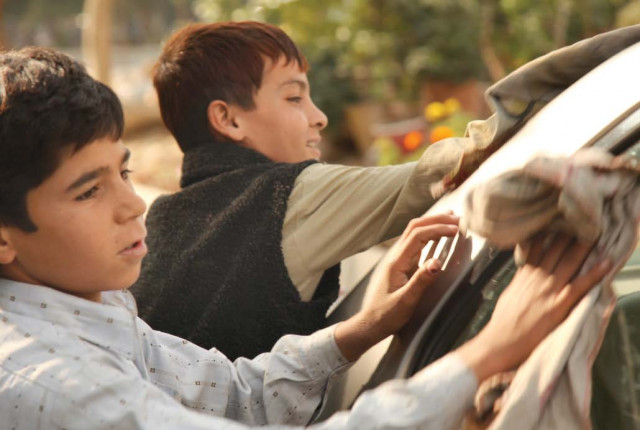Inflation, floods bear heavy on children
Food price inflation a key factor in worrying trend of increasing child labour and their abuse.

“His employers told us he had stolen gold jewellery and we could not see him or take him away till these had been paid for,” Zafar’s mother, Parveen Bibi, was quoted to have said in a report by IRIN, the UN information unit.
She said the boy had been sent out to work as the family was very poor.
“Hardship for almost all families is increasing because food is [becoming] more expensive,” Sikander Lodhi, an economic analyst, explained.
According to the Consumer Price Index of the Federal Bureau of Statistics, annual inflation was running at 15.37 per cent in November 2010. Food price inflation is a key factor in this trend.
“Poverty is a huge factor behind people sending their children out to work or even worse, selling them to those who use them as labourers,” agreed Salam Dharejo, national manager for child labour in the Society for the Protection of the Rights of the Child, an independent non-governmental organisation working for children’s rights in Pakistan.
“The recent floods have contributed to the rising child labour in the country since people who came into cities after being displaced from poverty-stricken districts in Sindh and the southern Punjab saw opportunities to obtain employment for their children in urban households,” he added.
At a busy fast-food outlet in Karachi, several small girls watch over children they are paid to babysit. Their charges are in many cases barely a few years younger than themselves. In houses across the country, the sight of children sweeping floors and washing dishes is barely worth an extra blink. These children are a part of the child labour force, which consists, according to official figures, of three million children under 18 years of age. Of these, according to a 2003 survey in six major cities by the government’s Commission for Child Welfare and Development, eight per cent are engaged as domestic workers.
The International Labour Organisation (ILO) puts the number of children working in the domestic sector at 264,000 in their 2004 report.
“The abuse of children who work as domestic labourers is under-reported. These children are often trafficked from rural areas of Sindh and the Punjab and brought to cities to work. As such they have no one to watch over them and are vulnerable to violence,” said Dharejo.
At least six child domestic workers were killed this year due to violence inflicted upon them, he said.
“My 10-year-old daughter now works in a big house, looking after a two-year-old and some cleaning chores. I worry about her constantly,” Saadia Bibi, 40, said.
And she has good reason to worry. Last month, in Multan, a young girl about the same age as Saadia’s daughter was working as a maid in a house and was brutally tortured because her employers believed she was possessed by evil spirits.
There have been other allegations of torture involving young maids although in the high profile case of 12-year-old Shazia Masih, whose employer was accused of her murder in January, 2010, a court in November acquitted him of the charges.
Mistreatment of child domestic workers, according to the limited research available, is widespread.
Sexual abuse is not uncommon either. According to the Alliance Against Sexual Harassment (AASHA), comprising a group of organisations working against the harassment of women in the workplace, 91 per cent of female domestic workers say they have suffered sexual abuse.
Published in The Express Tribune, January 8th, 2011.



















COMMENTS
Comments are moderated and generally will be posted if they are on-topic and not abusive.
For more information, please see our Comments FAQ